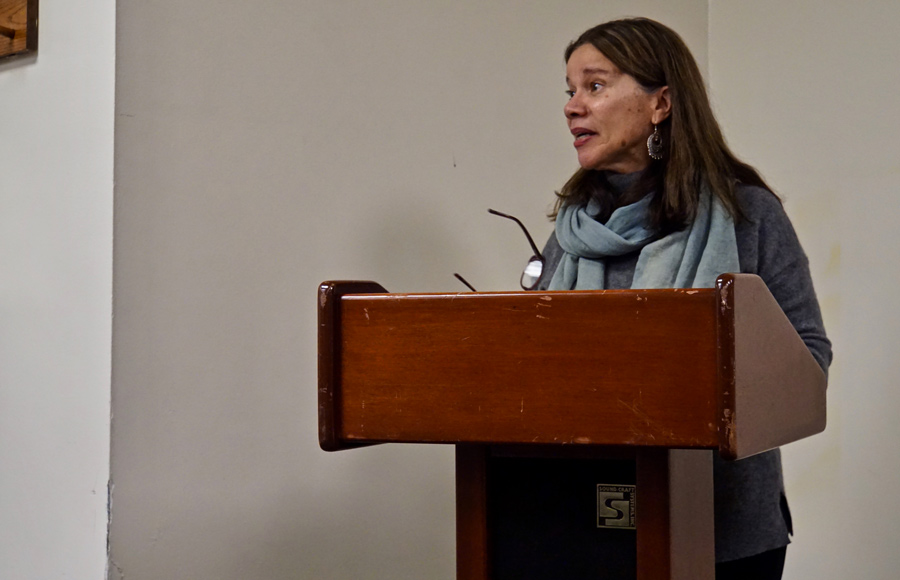Frances Aparicio, Northwestern student panelists discuss their experiences with multiple Latinx identities
Owen Stidman/Daily Senior Staffer
Author Frances Aparicio reads excerpts from her book “Negotiating Latinidad: Intralatina/o Lives in Chicago” at a panel and discussion hosted by Latinx Studies.
February 26, 2020
Frances Aparicio, author of “Negotiating Latinidad: Intralatina/o Lives in Chicago,” spoke about her recently published book and engaged in a panel discussion with three intralatina/o Northwestern students Tuesday.
Aparicio said her book is intimately connected to her experience as a Puerto Rican woman who migrated to the United States at 19 and has three Mexican-Puerto Rican children.
The book is based on 20 interviews, including many of Aparicio’s students from the University of Illinois at Chicago. It examines the complexities of claiming a space in Latino/a America that is further complicated by one’s family belonging to multiple national communities.
Through writing her book, Aparicio said she found that specific “moments or instances in the lives of intralatinos reveal the complicated ways in which identities are reaffirmed, diluted or both.”
Panelist and Weinberg senior Kevin Rodriguez shared his experience of how the role his parents played in his household determined how he balanced Venezuelan and Mexican identities with his Spanish background.
“My mom stayed at home with us and that influence of Mexican heritage and culture was really pronounced,” Rodriguez said.
The book also proposes the concept of horizontal hierarchies that Aparicio said allows readers to analyze the power differentials among the heterogeneous Latinx communities.
Growing up in Miami, where there is a large Latinx population, Rodriguez said he was often thought of as the “other” because of his Mexican identity in a Venezuelan, Colombian and Cuban dominated city.
The panelists had similar experiences with feeling excluded from one of their identities in particular spaces because of a horizontal hierarchy.
“There’s a lot of times where my family members or other people will put me in a box and focus on how I’m different rather than how I’m similar to them,” Rodriguez said.
Throughout the interview process, Aparicio said she learned more about how the emotional histories of an intralatina/o’s family determines how they identify with a particular nationality.
Medill senior Anabel Mendoza said that she felt isolated from her Puerto Rican heritage at times growing up because she spent the most time with her father’s Mexican family.
“I have very vivid memories of my uncle making fun of me and my brother because we were Puerto Rican,” Mendoza said. “It hurt because it wasn’t just that it was coming from my uncle — it was also that my dad wasn’t defending us.”
The three panelists also discussed passing as only one of their Latinx identities in certain spaces because it was convenient.
“I identify as all of them and I’m proud to be all of them,” Rodriguez said. “There are a lot of spaces created that make me feel like I’m not. The sense of belonging and not belonging at the same time which is very curious.”
In Aparicio’s book, she mentions that her interview subjects were at first quick to say their intralatinidad had not caused much conflict in their lives.
Graduate student Alicia Núñez is Guatemalan and Salvadoran. She said as she prepped for the panel, she found herself following what many of Aparicio’s interview subjects did.
“I felt the strange sensation that I was an imposter in the intralatino community,” Nunez said. “I kept wanting to build a narrative that would share a harmonious image of my Central American intralatinidad.”
Aparicio said Latinidad has been used as a homogenizing umbrella label, which drove her to praise the shifting meanings and contested ways in which the word is used.
She ended her discussion with the proposal of intralatinos as the new Americanos because of what their identities represent for dominant U.S. national imaginaries.
“Not only do they undo the rigid borders of white nationalism in the United States but they also embody within the space of family the multiplicities and transnational crossings that we usually frame hemispherically,” Aparicio said.
Email: [email protected]
Twitter: @samanthaguilar7
Related Stories:
– Latina and Latino Studies Program celebrates 10 years
– Northwestern professor talks competition in Latino-American literature


